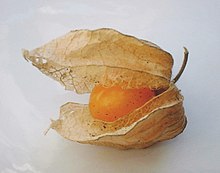physalis
See also: Physalis
English


Etymology
From (deprecated template usage) [etyl] New Latin Physalis, coined by Linnaeus from Ancient Greek φυσαλλίς (phusallís, “bladder, wind instrument”), from φυσιόω (phusióō, “to puff up, blow up”), φυσώ (phusṓ).
Pronunciation
Noun
physalis (plural physalises)
- Any plant of the genus Physalis.
- The fruit of such a plant, typically firm in texture with a mild, refreshing acidity.
Translations
plant of the genus Physalis
|
Anagrams
Latin
Etymology
From Ancient Greek φυσαλλίς (phusallís, “bladder”), from φυσιόω (phusióō, “to puff up, blow up”), φυσώ (phusṓ).
Noun
phȳsalis f (genitive phȳsalis); third declension
Declension
Third-declension noun (i-stem).
| Case | Singular | Plural |
|---|---|---|
| Nominative | phȳsalis | phȳsalēs |
| Genitive | phȳsalis | phȳsalium |
| Dative | phȳsalī | phȳsalibus |
| Accusative | phȳsalem | phȳsalēs phȳsalīs |
| Ablative | phȳsale | phȳsalibus |
| Vocative | phȳsalis | phȳsalēs |
Usage notes
Categories:
- English terms derived from New Latin
- English terms derived from Ancient Greek
- English 3-syllable words
- English terms with IPA pronunciation
- English lemmas
- English nouns
- English countable nouns
- Latin terms derived from Ancient Greek
- Latin lemmas
- Latin nouns
- Latin third declension nouns
- Latin feminine nouns in the third declension
- Latin terms spelled with Y
- Latin feminine nouns
- New Latin
- Specific epithets


